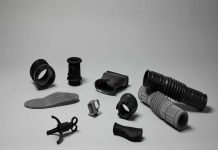Aerospace company Sidus Space has recognised additive manufacturing’s capability as a highly effective tool to optimise weight in systems designed to reach space, with the development of a 3D-printed satellite set to launch in 2023.
To be fit for launch in 2023, the satellite, dubbed as LizzieSat, cannot weigh more than 100 kilograms. And with all the components required to build a durable and functional satellite, Lead Design Checker and former NASA Engineer Tony Boschi and his team needed to re-imagine the project’s development and re-design the satellite’s entire structure.
To manufacture parts that are comparable in strength to metal while also reducing weight and lead time, the team leveraged 3D printing on Markforged’s Digital Forge Platform.
Every ounce matters
“Not many people think of how much a screw weighs,” Boschi said, but explained that obsessing over such efficiencies has allowed Sidus to shave precious ounces off of the frame.
Using Onyx FRA, Markforged’s flame-retardant and traceable version of its nylon Onyx material, Sidus was able to create structures that also house electronics, shaving precious ounces off of the satellite’s frame.
Boschi said the unique geometry of the supports “can’t be machined,” and makes room for customisations that build mounting opportunities in the structure itself that otherwise, would have required additional pieces and weight.
Markforged’s technology also enabled Sidus to dodge supply chain issues when an impeller broke on the machine that produces Sidus’ custom screws.
The hiccup would have required the machine to be down for weeks to months while waiting for the part, if not for Markforged’s technology that allowed Boschi to 3D print an exact replica on a Markforged X7 in under 40 minutes.
3D-printed constellation
Led by CEO and former US Navy officer Carol Craig, Sidus Space is building a business out of strong 3D-printed satellites that can serve a multitude of operations and customers in a single unit, thereby reducing the number of satellites needed in space.
The company’s partially 3D-printed LizzieSat satellites can carry customer sensors and other technologies, while also collecting data for insights on aviation, maritime, space services, earth intelligence, and observation, financial technology, and internet of things.
The Sidus Space team has spent the last four years working on the satellite, which is set to launch on the SpaceX Transporter-9 rocket in 2023.




















